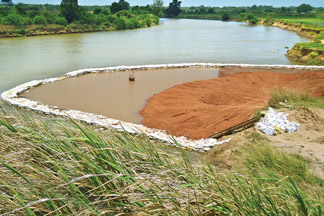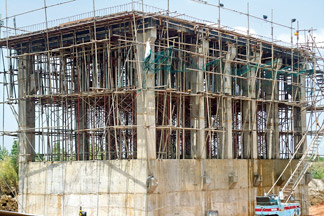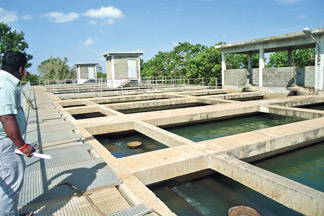Project to resolve Trinco's drinking water issues
By Mohammed NAALIR
The Trincomalee integrated water supply project and Ampara district
project will support the decentralized implementation of Rural Water
Supply and Sanitation (RWSS) activities in the local levels, backed by a
community-based approach where beneficiary communities participate in
decision-making at all stages of sub-project implementation.

Proposed intake site at Maheveli river at Allai |

Plaque at the construction site in Allai. |

The construction site of the pump house at Allai, Kantale.

The filter station at Kantale plant.
Pix. Mohammed Naalir |
The community is represented by community-based organisations and
held responsible for construction, operation and maintenance of water
supply and sanitation facilities. This project provided technical
assistance to the Eastern Provincial Council in carrying out its
functions under this new initiative in relation to planning,
implementation and management of the project. The Consultants also
ensure effective transfer of expertise and advice on all matters of
project planning and management in conformity with the Project
Implementation Plan (PIP). The project targeted three local authorities
in each of the two districts for the implementation of the RWSS
activities. RDC fielded services of a Community Development Specialist,
Water Supply technical specialist and a Hydro-geologist for each
district, along with a financial assistant and a senior technical
officer to each LA.
The key task assigned to consultants was the completion of sub
projects at village level within the stipulated time frame, and assuring
their sustainability by strengthening the CBOs.
Minister of Economic Development Basil Rajapaksa inaugurated the
rehabilitation and upgrading of the Kantale Water Treatment Plant and
the Trincomalee integrated water supply project. The new water supply
scheme has been planned to resolve drinking water problems of the people
in the Trincomalee District
Once the greater Trincomalee integrated water supply project is
completed over 65,000 connections can be given and 330,000 people will
benefit.
The present supply hours are less than 12 hours and moves are under
way to increase the supply hours from 12 to 24 hours.
the French Development Agency will fund Euro 10.35 million for this
project, Sri Lanka Government and French Ministry of Finance are funding
Rs. 1003 million and Euro 12.50 million respectively for this project.
The components of the Greater Trincomalee Integrated Water Supply
project are rehabilitation and upgrading of Kantale Water Treatment
Plant (rehabilitation of clarifiers, filters, pumping building,
construction of new filters and clarifiers, rehabilitation of building,
reagent building, chlorination building and distribution tank),
workshop, garages, generator and transformer building to increase the
pipe borne water supply from 5.5 million to 12.00 million gallons per
day.
The coverage area of the Project is Trincomalee and Gravets, Kinniya,
Thambalagamuwa and Kantale.
Augmentation of Existing Water Treatment Plant with additional source
with raw water main and construction of tower, laying transmission main
and laying of distribution networks.
A top rank officer attached to the National Water Supply and Drainage
Board said that DI pipe will be laid to 21 kilometre from Allai intake
to Kantale Water Treatment Plant.
The construction of intake, pump house, reservoir rehabilitation,
water tower construction in Kinniya, PE pipe laying from Thambalagamuwa
to Kinniya, distribution line for town and gravets, Sampaltivu,
Thambalagamuwa, Kantale and Kinniya also come under the Greater
Trincomalee Integrated Water Supply project.
The Trincomalee District which belongs to the Eastern Province is
surrounded by Anuradhapura, Batticaloa, and Mullaitive districts. The
population account to 412,457 persons belonging to 105,155 families.
The land area covered by the district is 272,880 square kilometre.
There are 11 Pradeshiya Sabhas and 2 Urban Councils in the district,
represented by 230 Grama Seva Divisions.
The area covered by water resources amount to 98 square kilometre.
Majority of the population indulge in agricultural work. 44 percent of
the land in the district is utilized for agricultural activities. The
Forest covers 30 percent of lands in the district.
The Government has implemented giant infrastructure development
projects as well as livelihood development projects in both provinces.
The Government along with its international donors have incurred
millions of rupees to restructure and rehabilitate the region victimized
by the terrorism. Once the implemented development projects are finished
the North and East will be the gateway of development of this country.
The terrorism affected North and East are returning to normal
smoothly and rapidly. The giant bridge constructions and mega water
supply projects can be seen in the region where only moaning and chaos
were the daily occurrences.
The people who were neglected fundamental rights due to the LTTE
terrorists now are enjoying real life with freedom.
The Government is reaching the peak of the development in the
Northern and Eastern provinces. The safe drinking water supply to those
people takes significance beyond all these development projects.
The Ministry of Water Supply and Drainage is engaged in the process
of providing safe drinking water to the masses of this country including
the North and East under the Mahinda Chinthana national development
concept.
The duties are to formulate a national policy on drinking water and
sanitation, coordinate with local and foreign stakeholders in the fields
of water supply and sanitation, coordinate between local contractors and
subcontractors involved in the fields of water supply and sanitation,
implement awareness programs on the use of drinking water produced at a
high cost sparingly, formulate laws, regulations and legislations
relevant to the fields of water supply and sanitation, ádesign a data
system relevant to the field of water supply, implement the national
policy on Rain Water Harvesting, make proper arrangements to reduce
non-income generating water, regulate the progress of water supply and
sanitation projects through Results Based Management initiatives and
achieve the goal of providing safe drinking water to 85 percent and
adequate sanitation facilities to 88 percent of the population by the
year 2015 as per the development objectives of the new millennium.
The complex environment and the growing pressures from an increasing
population have led to an urgent need for reliable and safe water supply
to meet demands of the urban as well as rural communities.
The National Water Supply and Drainage Board (NWSDB) has granted
greater autonomy to the Regional Support Centres (RSCs), which are
currently functioning as a Department in NWSDB.
This requires a whole range of management and business tools,
including a business plan, before autonomy can be effective. Danish
International Development Agency (DANIDA) is supporting the Government
of Sri Lanka in these efforts to rehabilitate and extend existing water
supply and sewerage systems. Resources Development Consultants (RDC)
(Pvt) Ltd is fielding five consultants in the fields of water supply,
training, curriculum development, and Management Information System
(MIS) for a period of 3 years. Community Water Supply and Sanitation
Projects (CWSSP) in Trincomalee and Ampara Districts takes significance
in fulfilling the safe water need of the people in both districts
including the villages. |

